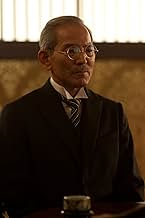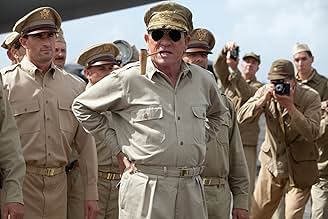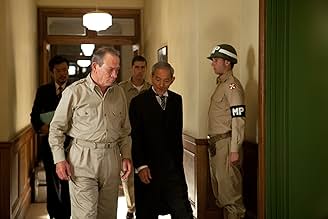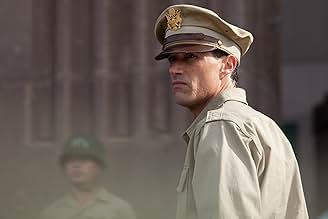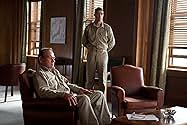As the Japanese surrender at the end of World War II, General Fellers is tasked with deciding if Emperor Hirohito will be hanged as a war criminal. Influencing his ruling is his quest to fin... Read allAs the Japanese surrender at the end of World War II, General Fellers is tasked with deciding if Emperor Hirohito will be hanged as a war criminal. Influencing his ruling is his quest to find Aya, an exchange student he met years earlier in the U.S.As the Japanese surrender at the end of World War II, General Fellers is tasked with deciding if Emperor Hirohito will be hanged as a war criminal. Influencing his ruling is his quest to find Aya, an exchange student he met years earlier in the U.S.
- Director
- Writers
- Stars
- Awards
- 1 nomination total
- Director
- Writers
- All cast & crew
- Production, box office & more at IMDbPro
Featured reviews
Historical, Not Historic
An intimate and criminally underrated war drama.
While Tommy Lee Jones relishes in playing every Tommy Lee Jones character ever (stealing all the best lines in the process) as the hard-nosed but cunning General MacArthur, Fox delivers a more grounded and arresting performance as Bonner Fellers, a man torn between his moral obligations and his duty to the army, and to an American public crying out for blood.
Director Peter Webber infuses a romantic subplot with Fellers' Japanese girlfriend Aya (Eriko Hatsune) neatly, filling a role but never interjecting into a story that, quite frankly, is underscored by the power of men post-war. When MacArthur finally comes face-to-face with the Emperor after an excruciating build-up, the scene's emotional force and intense interplay perfectly resonate the best attributes of this vastly underrated drama.
*There's nothing I love more than a bit of feedback, good or bad. So drop me a line on jnatsis@iprimus.com.au and let me know what you thought of my review. If you're looking for a writer for your movie website or other publication, I'd also love to hear from you.*
A very tense look at how the fate of Japan was decided after WWII. Jones is great and history buffs will love this. I did. I say B+
The Genesis of a Decision
Emperor concerns those fateful first days of the occupation when MacArthur made the decision not to try the Emperor or members of the royal family as war criminals. Doing the investigation on MacArthur's behalf was General Bonner Fellers who was an army intelligence officer with a background in Japanese language and culture. Matthew Fox is General Fellers and he's got another mission for himself, to find an exchange student from Japan from his youth and whom he knew up to the declaration of war between the USA and Japan.
Tommy Lee Jones plays MacArthur and while he doesn't have that majestic cultured voice that MacArthur had, he still creates a good impression of the imperious general who had a dislike of civil authority. In fact traces of the behavior that got him sacked by Harry Truman during the Korean War are shown. In this case though MacArthur with help of Fellers and his own knowledge of the Asian scene had the right instincts.
The Emperor of Japan centuries ago was a true ruler and over the centuries evolved into a constitutional monarch. But not the same as that Windsor family that reigns in the United Kingdom. The Japanese Shinto religion conferred divine status, the original emperor one Jimmu Tenno is supposed to be descended from the sun god. Japan's wars and foreign policy were done in his name, still are to some extent. A greater decision from Hirohito's part came when he said that he and his family were not divine.
Not covered in this film was the fact that Hirohito had some brothers, at least one of them would have been a more than willing tool of the army and navy chiefs who conducted Japan's war. He faced until the surrender the distinct possibility of being overthrown himself by one of his siblings.
Matthew Fox and Tommy Lee Jones and the Japanese cast are perfectly cast in their roles and I recommend this film as good entertainment and for those with an interest in the Far East.
Very interesting story about General Fellers who is given the impossible task to investigate the Emperor's role in the lead-up to war,
This is a good drama war with emotion , suspense , thrills , culture clashes , and historical events . The picture contains a marvelous story of love and understanding set amidst the tensions and uncertainties of the days immediately following the Japanese surrender at the end of World War II. Excellent cast gives good acting as Fox who plays Bonner Fellers, a general who's sent to Japan to decide if Emperor Hirohito will be hanged for war crimes ; starring alongside him is Eriko Hatsune as Aya Shimada, a woman Fellers romanced years earlier, and Tommy Lee Jones as legendary Us military figure General Douglas MacArthur. The movie displays a colorful as well as adequate photography by Stuart Dryburgh . Emotive and evocative musical score by Alex Heffes . The flick was professionally directed by Peter Webber (Hannibal , The girl with a pearl earring). This true life story was one worthy of big-screen treatment .
The picture is well based on true events , these are the followings : After the war, Fellers played a major role in the occupation of Japan. Among his duties was liaison between HQ and the Imperial Household. Soon after occupation began, General Fellers wrote several influential memoranda concerning why it would be advantageous for the occupation, reconstruction of Japan, and U.S. long range interests to keep the Emperor in place if he was not clearly responsible for war crimes. He met with the major defendants of the Tokyo tribunal. In their research and analysis of events and considerable controversy about the time period, according to historians Herbert Bix and John W. Dower, Fellers—under an assignment by the code name "Operation Blacklist"—allowed them to coordinate their stories to exonerate Emperor Hirohito and all members of his family. This was at the direction of MacArthur, now head of SCAP, who had decided that there was to be no criminal prosecution of the Emperor and his family. He will question the accused Class -A War Criminals such as Wartime Prime Minister Hideki Tojo, Former Prime Minister Konoe, and Koichi Kido while confronting prejudice from a resentful populace and other American soldiers. General Fellers, who came from a Religious Society of Friends family (commonly known as Quakers) and attended the Quaker-affiliated Earlham College, was instrumental in the selection of Elizabeth Vining, an American Quaker educator, as tutor to the Emperor's children. Ms. Vining was followed after 4 years by another Quaker educator, Esther Rhoads.In 1971, Emperor Hirohito conferred on Fellers the Second Order of the Sacred Treasure "in recognition of your long-standing contribution to promoting friendship between Japan and the United States."
Did you know
- TriviaThe romantic story between Fellers and Aya was entirely fictional for the film. Bonner F. Fellers was married in 1925 to Dorothy Dysart who accompanied him twice on his posting to the Phillipines, and she also went with him to China and Japan.
- GoofsIn the opening sequence the film makers use archival film showing an atom bomb being loaded into the bomb bay a B-29 for the attack on Hiroshima. The bomb shown is "Fat Man" and not "Little Boy" that was used on the attack on Hiroshima (8-6-1945). "Fat Man" was used in the second attack, three days later (8-9-1945) on Nagasaki.
- Quotes
General Douglas MacArthur: I don't want the Communists in here. But Washington wants vengance on the emperor, because their voters do, and their voters have no fucking idea what's good for them.
- How long is Emperor?Powered by Alexa
Details
- Release date
- Countries of origin
- Official sites
- Languages
- Also known as
- Nhật Hoàng
- Filming locations
- Production companies
- See more company credits at IMDbPro
Box office
- Gross US & Canada
- $3,346,265
- Opening weekend US & Canada
- $1,014,099
- Mar 10, 2013
- Gross worldwide
- $14,858,240
- Runtime
- 1h 45m(105 min)
- Color
- Sound mix
- Aspect ratio
- 2.35 : 1








